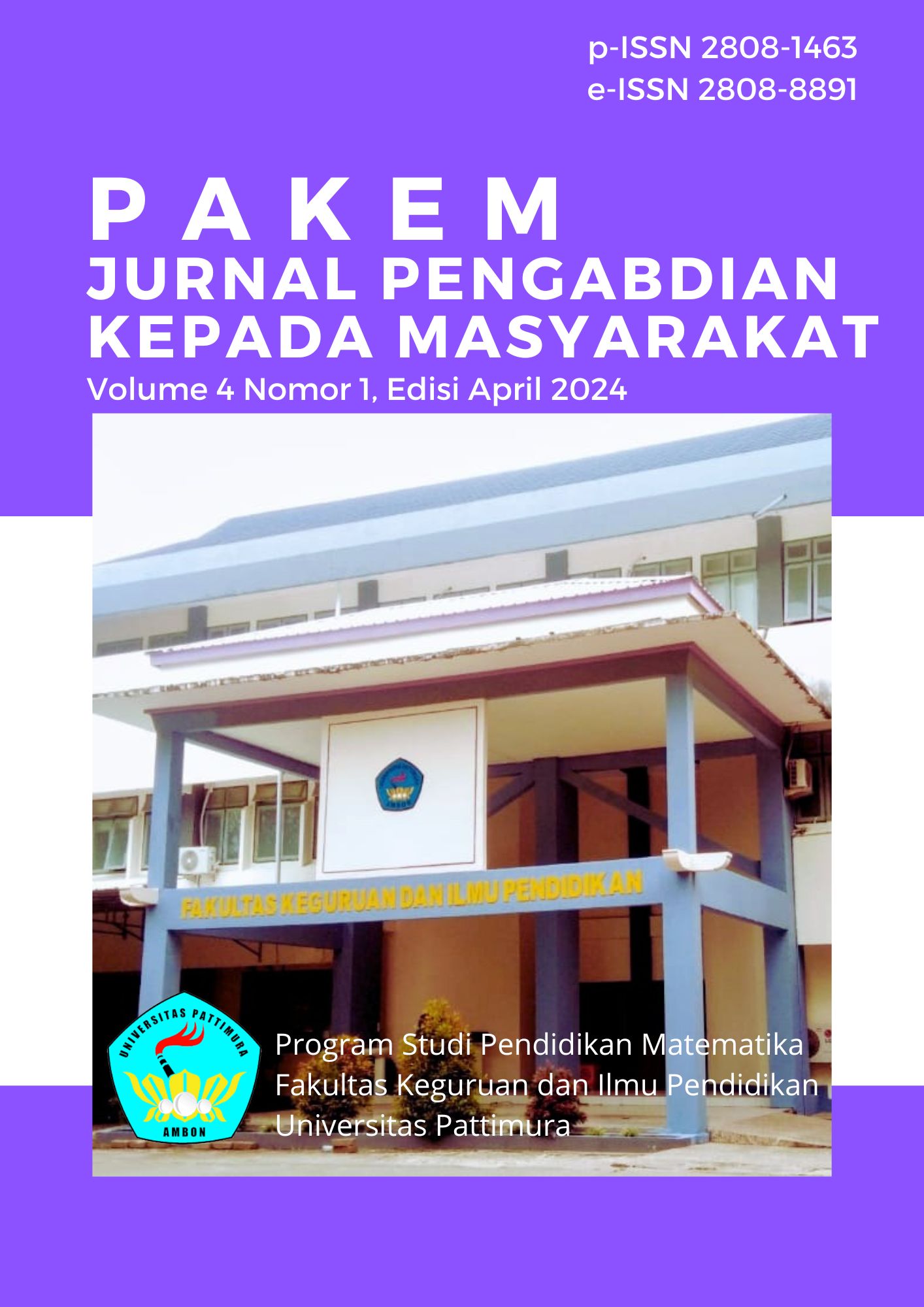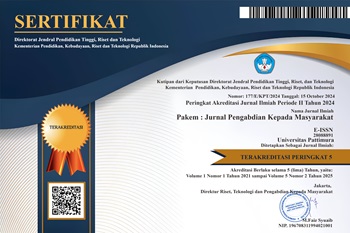CERITA HIDUP BERSIH: PENGETAHUAN PERILAKU HIDUP BERSIH DAN SEHAT YANG MENYENANGKAN UNTUK ANAK PAUD AL-GUFRAN BERSAMA MAHASISWA KKN WAIHAONG ANGKATAN L
Abstract
Clean and healthy living behavior has a central role in shaping the foundation of early childhood health (PAUD), therefore we feel that knowledge about clean and healthy living behavior (PHBS) for early childhood needs to be educated in everyday life. For this reason, in this community service, we KKN students conducted a socialization of clean and healthy living behavior in one of the pre-schools in the Waihaong Ambon village, Paud Al-Gufran. In the implementation of this socialization we used fun methods with storytelling and singing techniques. The application of the method in the implementation of this socialization is the delivery of material by presenting a dongen story entitled "The Importance of Washing Hands" and teaching the steps of washing hands properly and correctly with song guidance. The results of the activities carried out to form the foundation of students' knowledge about clean and healthy living behavior in the school environment, and they have also been able to do 6 steps of good and correct hand washing according to WHO.
Downloads
References
Aziz, Z., Aseptianova, A., Nawawi, S., & Yuliany, E.H. (2019). Hiegene dan Sanitasi CUCI Tangan Pakai Sabun Di Kelurahan Kebun Bunga Keacamatan Sukarami Kota Palembang. Batoboh.
Fitriani, S., & Agustini, F. (2019). Sosialisai Permainan Ular Tangga Untuk Meningkatkan Perilaku Hidup Bersih dan Sehat di SDN Margamulya Keacamatan Singaprarna Kabupaten Tasikmalaya Tahun 2018. Jurnal Abdimas Kesehatan Tasikmalaya.
Imam Rofiki, & Siti Roziah Ria Famuji. (2020). Kegiatan Penyuluhan dan Pemeriksaan Kesehatan untuk Membiasakan PHBS bagi Warga Desa Kemantren. Dinamisia : Jurnal Pengabdian Kepada Masyarakat, 4(4), 628-634. https://doi.org/10.31849/dinamisia.v4i4.3992
Indonesia. Kemensos RI. (2020). Perilaku Hidup Bersih dan Sehat: Penguatan Kapabilitas Anak dan Keluarga. April 8, 2020, from https://kemensos.go.id/uploads/topics/15863905705284.pdf
Jakarta. Kemekes RI. (2016). Gerakan PHBS Sebagai Langkah Awal Menuju Peningkatan Kualitas Kesehatan Masyarakat. Januari 1, 2016, from https://ayosehat.kemkes.go.id/phbs
Meiwanda, G., Untsadewan, Q. N., Paulina, R., Cahyani, S. I., Bashiroh, A., Lilian, D., Salsadila, D., Silalahi, C. D., Rahmana, Z. A., Hakim, A. N., & Pramudia, T. S. (2022). Edukasi penerapan perilaku hidup bersih dan sehat di sekolah untuk menghadapi Era New Normal. Unri Conference Series: Community Engagement, 4, 73-77. https://doi.org/10.31258/unricsce.4.73-77
McKibbin, B. (2007). Deep economy: The wealth of communities and the durable future. New York: Times Books/Henry Hold and Co.
Pigg, K. E., & Bradshaw, T. K., (2003). Catalytic community development: A theory of practice for changing rural society. In D. L. Brown & L. E. Swanson (Eds.), Challenges for rural America in the twenty-first century (pp. 385-396). University Park, PA: Pennsylvania State University Press.
Risaldy, Sabil, Manajemen Pengelolaan Sekolah Usia Dini, Jakarta: Luxima, 2004.
U.S. Census Bureau. (2000). State and Country QuickFacts. Washington, D.C.: United States Bureau of the Census. Retrieved November 7, 2008, from http://quickfacts.census.gov/qfd/
Wicaksono, A.S. (2020). Perilaku Hidup Bersih dan Sehat Pada Diri Siswa SDN Sonoadi Karannggeneng Lamongan.
Wulandary, H. (2014). Pelaksanaan Pendidikan Kesehatan, Perilaku Hidup Bersih dan Sehat pada Anak Usia Dini.
Zaini, A. (2015). Bermain Sebagai Metode Pembelajar Bagi Anak Usia Dini. Jurnal Inovasi Pendidikan Guru Raudhatul Athfal.
Copyright (c) 2024 PAKEM : Jurnal Pengabdian Kepada Masyarakat

This work is licensed under a Creative Commons Attribution-NonCommercial-ShareAlike 4.0 International License.
Authors who publish with PAKEM: Jurnal Pengabdian Kepada Masyarakat agree to the following terms:
- Authors grant copyright to the journal and right of first publication with the work simultaneously licensed under a Creative Commons Attribution License (CC BY-NC-SA 4.0)
- Authors are able to enter into separate, additional contractual arrangements for the non-exclusive distribution of the journal's published version of the work (e.g., post it to an institutional repository or publish it in a book), with an acknowledgment of its initial publication in this journal.
- Authors are permitted and encouraged to post their work online (e.g., in institutional repositories or on their website) prior to and during the submission process, as it can lead to productive exchanges, as well as earlier and greater citation of published work.


1.png)













